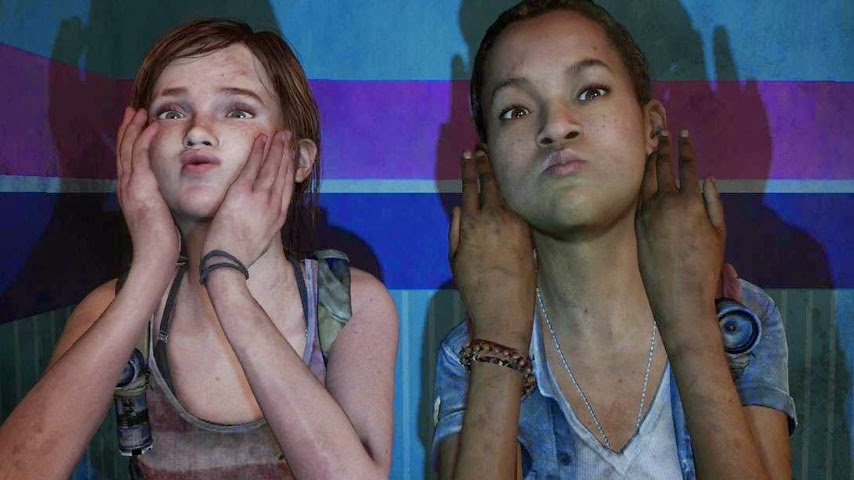How a video game bested all other film romances last year....(WARNING: Minor Spoilers)
Truly good romances are hard to come by in film nowadays.
Long gone are the days of Woody Allen's 'Annie Hall' or Cameron Crowe's 'Say Anything', now replaced by dreadful Nicholas Sparks adaptions or cheap Jennifer Aniston vehicles. While some modern movies are an exception, it hasn't been since 2007's music love story, 'Once' that I've felt wholly satisfied or convinced by a romance on the big screen. This past year at the cinema has been almost devoid of any intriguing love stories. However, there was one piece of work in 2014 that had a beautiful, progressive, subtle and realistic romance between two characters unlike one I've ever seen in mainstream media...and it's a video game DLC.
'Last of Us: Left Behind' is a two hour gaming companion piece to the epic, breathtaking 'Last of Us' (2013) from the critically-acclaimed SONY-based studio NAUGHTY DOG. 'Last of Us' was an incredible experience, and pushed the video game media's storytelling boundaries to a new level of quality. Not only was the gameplay brutal and fun, not only was the design of the post-appocalyptic sets and infected creatures handled expertly, but the character relationships were so beautiful and elevated the cliched apocalypse backdrop to something far more special. With all of this praise, NAUGHTY DOG writers/directors chose to take the players back to this world in February of last year with their prequel DLC 'Left Behind' (not to be confused with the horrendous Nic Cage movie) focusing on the game's female-lead, Ellie, months before the events of the game, and the friendship with her partner-in-crime, Riley, while they spend their day at an abandoned mall, beginning with fun and ending in tragedy.
'Left Behind's gameplay doesn't offer anything entirely new, when compared to the main game released eight months prior. Nor are the graphics a quantum leap. Yet, 'Left Behind' manages to push the boundaries in mainstream storytelling even further, by the addition of a love story between two, young female leads. Ellie and Riley start off seeming like close friends who've had their ups and downs. However, the game gets the player involved in tiny, intimate, silly moments with Riley. Whether, it's playing with water guns, messing around in a photo booth, or running around an arcade, we see Ellie and Riley in comfortable, believable environments. We see them argue and struggle with who they are. It asks an intriguing question: How can a girl still remain a girl in a world of such violence and despair? Riley turns out being the only person Ellie knows who wants to still be positive and rebellious in this environment. I started to realize that this relationship between the two may be more than just a friendship after Ellie and Riley share one long look at each other. This look alone made me realize what was happening; they love each other. I've sat through tons of romance stories the past couple of years, and none of them had moments as genuine as that one small look our heroines shared in a run down photo booth.
However, I didn't think the game would be ballsy enough to take this idea any further than just that look. But then our two characters begin dancing to a 60s rendition of 'I Got You Babe' sung by Etta James on top of a TV display counter. Then, all of a sudden, something amazing happens. Something groundbreaking for not only the progression of video game stories, but mainstream media itself.
Have a look:
From the animation on their faces, to the sudden kiss, to the moment where Ellie apologizes and Riley replies: "For what?", this is the most realistic depiction of falling in love I've seen in media for quite a long time. NAUGHTY DOG took a heavily debated issue and without warning or any terms of apology put it into their best-selling video game's DLC. It's one of the most admirable things any storyteller did in 2014. It follows right behind Richard Linklater's 12 year movie project 'Boyhood' or Alejandro Innaritu's "one shot" flick, 'Birdman' in terms of sheer audacity, in my opinion.
Sadly, most people outside of the gaming community were not aware of this tremendously progressive sequence, even after nearly a year of this DLC being on the market. It's important, not only to the art form, but for young girls who may be struggling with certain feelings, parent groups who think video games are nothing but mindless murder simulators, the LGBT community who don't feel they are represented well enough in this form of entertainment, or people who just admire strong, audacious storytelling.
To think a male-written video game DLC would handle a more progressive love story with such realism and emotional heft than those in your local cineplexes over the past couple years may be crazy...but that's what happened.
Article by: Josh McCormack




Comments
Post a Comment